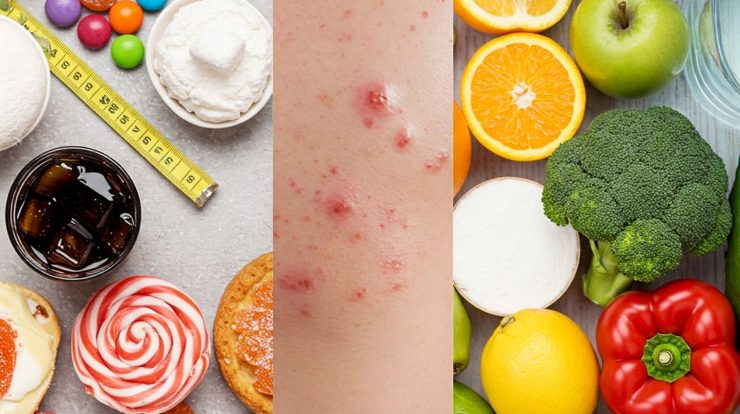
The connection between what we eat and how our skin looks is a topic of constant interest, and one question frequently arises: can sugar consumption lead to acne breakouts? For years, anecdotal evidence suggested a link, and now, scientific research is increasingly supporting the idea that high sugar intake can indeed be a contributing factor to acne development and severity for some individuals. While acne is a complex condition with multiple causes (including genetics, hormones, bacteria, and inflammation), understanding the potential role of sugar is crucial.
The Sugar-Acne Connection: How Does it Work?
The primary way sugar is thought to influence acne involves its effect on blood sugar and hormones:
- Blood Sugar Spikes: Consuming sugary foods and drinks, as well as refined carbohydrates that break down quickly into sugar (high-glycemic foods), causes a rapid increase in your blood glucose levels.
- Insulin Response: Your body releases the hormone insulin to help move glucose from your bloodstream into your cells for energy. A sharp spike in blood sugar leads to a correspondingly large release of insulin.
- IGF-1 Increase: High levels of insulin can stimulate the production of another hormone called Insulin-like Growth Factor 1 (IGF-1).
- Hormonal Effects: Both elevated insulin and IGF-1 can influence other hormones. They can increase the production of androgens (like testosterone, present in both men and women), which are known potent stimulators of oil glands. They can also make skin cells more sensitive to these androgens.
- Increased Sebum Production: Androgens signal the sebaceous glands in your skin to produce more sebum (oil). Excess sebum is a key factor in the development of acne, as it can clog pores.
- Increased Inflammation: High sugar intake and the resulting hormonal cascade (particularly involving IGF-1) can also promote systemic inflammation throughout the body. Acne is fundamentally an inflammatory condition, so increased inflammation can worsen existing breakouts or trigger new ones.
- Skin Cell Growth: Some research suggests IGF-1 may also stimulate the growth of keratinocytes (skin cells), potentially leading to more dead skin cells available to clog pores.
In essence, high sugar consumption can trigger a hormonal and inflammatory chain reaction that creates a more favorable environment for acne to develop.
What Kind of Sugar Matters Most? (High-Glycemic Index)
It’s not just about the obvious spoonful of sugar in your coffee. The speed at which a food raises your blood sugar is critical. This is measured by the Glycemic Index (GI) and Glycemic Load (GL).
- High-GI/GL Foods: These are the main culprits linked to acne through the insulin/IGF-1 pathway. They include:
- Sugary drinks (soda, sweetened juices, sweetened coffee/tea)
- Candy, sweets, chocolate (especially milk chocolate)
- White bread, white rice, white pasta
- Sugary breakfast cereals
- Baked goods (cakes, cookies, pastries)
- Many processed snack foods
- Lower-GI/GL Foods: These cause a slower, more gradual rise in blood sugar. They include:
- Non-starchy vegetables
- Most whole fruits (the fiber slows sugar absorption)
- Legumes (beans, lentils)
- Whole grains (oats, quinoa, brown rice, whole wheat bread)
- Nuts and seeds
While natural sugars in whole fruits are generally less problematic due to fiber content, excessive consumption of high-sugar fruits or fruit juices could still contribute to a high overall sugar load for some individuals.
What Does the Research Say?
- Observational Studies: Several studies have found correlations between diets high in sugary foods and high-glycemic load carbohydrates and a higher prevalence or severity of acne.
- Intervention Studies: Some studies where participants were placed on low-glycemic load diets showed improvements in acne lesions and insulin sensitivity compared to control groups on higher-glycemic load diets.
- Limitations: While the evidence is growing, many studies are observational (showing correlation, not necessarily direct causation). Diet is complex, and isolating the effect of sugar alone is challenging. More large-scale, long-term randomized controlled trials are needed.
Does Everyone React the Same Way?
No. As with most dietary influences, individual susceptibility varies greatly. Some people can consume significant amounts of sugar with no noticeable effect on their skin, while others find even small amounts trigger breakouts. Factors like genetics, baseline hormone levels, gut health, and overall lifestyle play a role.
Practical Tips for Managing Sugar Intake for Skin Health
If you suspect sugar might be contributing to your acne, consider these steps:
- Limit Sugary Drinks: This is often the easiest and most impactful change. Swap soda, juice, and sweet coffee drinks for water, unsweetened tea, or sparkling water.
- Reduce Processed Foods & Sweets: Cut back on candy, cookies, cakes, pastries, and processed snack foods high in added sugars and refined carbohydrates.
- Choose Whole Grains: Opt for brown rice, quinoa, oats, and whole-wheat bread instead of their white, refined counterparts.
- Prioritize Whole Fruits: Choose whole fruits over fruit juices or dried fruits (which concentrate sugar).
- Read Food Labels: Become aware of hidden sugars in sauces, condiments, yogurt, cereals, and prepared meals. Look for ingredients like high-fructose corn syrup, sucrose, dextrose, etc.
- Focus on a Balanced Diet: Emphasize whole, unprocessed foods like vegetables, fruits, lean proteins, and healthy fats, which generally have a lower glycemic load.
Important Note: Sugar Isn’t the Only Factor
While reducing sugar intake may help improve acne for some people, it’s rarely a magic bullet. Remember that acne is multifactorial. Stress, hormonal changes, genetics, skincare routines, and bacteria all play significant roles. Dietary changes should be part of a holistic approach.
Conclusion
Can sugar consumption lead to acne? The current scientific evidence strongly suggests yes, it can be a significant contributing factor for many individuals. Diets high in sugar and refined carbohydrates (high-glycemic load) can trigger hormonal fluctuations and inflammation that promote acne development. Reducing your intake of sugary drinks, sweets, and refined grains may help improve your skin. However, remember that individual responses vary, and diet is just one piece of the complex acne puzzle. For persistent or severe acne, consulting a dermatologist is always the best course of action.
